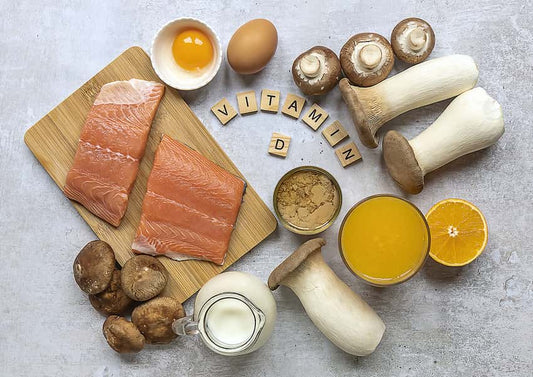Everyone knows the importance of protein for health and fitness.
And many may also know the importance of leucine - an amino acid crucial for building muscle and increasing strength.
An ingredient that is much less well known, but still vital for success, is HMB.
In this article, we'll look closer at HMB supplement benefits and why you’d want to consider using a supplement which contains this ingredient.With no further ado, let's get started!
What is HMB?

β-Hydroxy β-Methylbutyrate is a bit of a mouthful, so it is more commonly referred to as to HMB. It is a chemical that is formed by the breakdown of leucine (an amino acid). HMB is, therefore, a naturally produced substance in the body. However, there appears to be many benefits associated with increasing your HMB levels through supplementation.HMB is used medically to speed up wound healing, and it is also given to people who might lose muscle mass due to illnesses such as cancer. There is also a lot of research looking at the effects of HMB on preventing muscle wastage in the elderly.
While HMB can be found naturally in certain foods, the presence of it is so low that you would see no benefits from it.HMB is increasingly being looked at as a useful supplement for sport and exercise, with numerous benefits associated with its use.
But right now, it would be fair to say that HMB is an under-used and underrated supplement.
With that in mind, let's delve deeper into its benefits.
5 Benefits of HMB Supplementation
In this section, we will examine the benefits of taking HMB as a supplement; more specifically, in the realm of fitness and nutrition. Let’s dive in.
Benefit #1: HMB Supplementation May Prevent Muscle Loss
As we mentioned earlier, HMB is being heavily researched regarding the prevention of muscle loss in the elderly, along with people experiencing muscle wasting because of illness.
But HMB also appears to be effective at preventing muscle loss under calorie restriction.
One of the downsides of dieting is that it can lead to a reduction in muscle mass.
Not a huge loss, but certainly noticeable. This is often due to a decrease in protein and therefore, muscle protein synthesis (the process in which muscle is made and maintained).
Increasing your protein intake is a great way to prevent this, as is focusing on raising leucine. However, HMB may be just as effective. A 2008 study in the Journal of Nutrition & Metabolism stated that:
“HMB may also directly stimulate protein synthesis, through an mTOR dependent mechanism”.
If you are dieting, particularly when cutting for a competition, HMB may be able to reduce muscle loss while you are in a large calorie deficit. As a result, it helps you to preserve muscle.
Benefit #2: HMB Increases Muscle Size & Strength
Finding ways to increase the amount of muscle you can grow during a workout is the most significant focus of most supplements. HMB is fast becoming well-known for this exact benefit.
Studies have shown that HMB can increase strength, power, and hypertrophy concerning a placebo. However, the research is relatively recent, and it must be said that several studies have not found a difference.
At present, there appears to be evidence that HMB can increase strength, power, and hypertrophy, but more research is required before we can say for sure.
Benefit #3: HMB Supplementation can Improve Recovery from Exercise
This third benefit is perhaps the most researched, and most useful. There is a lot of evidence that supplementation with HMB can lead to improved recovery from intense exercise.
Studies have found HMB supplementation to reduce muscle damage and reduce recovery time.
People who want to get bigger and stronger often overlook this benefit. But talk to any bodybuilder or athlete, and they will state that recovery is crucial if you want results.
Benefit #4: Supplementing HMB may Reduce Body Fat
We were hesitant to put this down as a benefit, as it is a little misleading. But several studies have found that HMB led to increased body fat reduction compared to the placebo.
Although, this was more to do with HMB allowing the person to exercise harder and more frequently (which burns more calories).
Just taking HMB and doing nothing else will not lead to fat loss results. Instead, HMB allows you to train harder and recover better - meaning that you can get better results. Be that increased muscle size (mentioned above) or more fat burned.
Benefit #5: HMB may Improve Athletic Performance
While we partially covered this in benefit #2, HMB appears to improve athletic performance - particularly in aerobic and anaerobic exercise. It does this by increasing your body’s resistance to fatigue.
The longer your body takes to fatigue, the longer you can perform at a high intensity.
Whether this is sprinting at 100% for an extra couple of seconds, running an extra 500m at a low intensity during a football match, or cranking out an extra rep on the bench press.
Reducing fatigue is a fantastic way to improve your athletic performance, and HMB appears to be effective at doing this .
Optimal HMB Dosage and Side Effects
The reason for the increase in popularity of HMB supplementation is due to it being generally safe to use.
However, it is always recommended to consume sensible dosages that have been shown to be effective in clinical studies without going overboard.
A study in the JISSN (Journal of the International Society of Sports Nutrition) concluded that HMB should be supplemented in dosages of 1-2 grams. At around 30-60 minutes prioer to exercising.
This is why the Burn Lab Pro formula, for instance, contains 1 gram of HMB per serving and is designed to be taken 30 minutes prior to training.
Final Thoughts: Is It Beneficial and Worthwhile to Supplement HMB?
HMB is a relatively new supplement since it was only discovered in the 90s. And it only fell into mainstream use in the last few years.
As such, research on its effectiveness is still in its infancy.
But from what has been found out so far, HMB has shown the potential to dominate the supplement world in a similar vein to creatine or caffeine.
When to Take HMB: While Dieting or Building Size & Muscle
One popular question asked is "when should I take HMB?".
If you are currently dieting but don’t want to lose muscle mass, then HMB could well be the ideal supplement for you.
The combination of HMB's benefits of allowing someone to train harder and recover better, while being able to also prevent muscle loss while in a calorie deficit, makes this supplement incredibly useful on a diet.
Ultimately, this makes HMB a Beneficial Addition to a Fat Burner Supplement
People often only focus on thermogenics when choosing a fat burner. But the last thing you want while on a calorie deficit (in order to lose weight) is to see your precious muscle mass wasting away.
So while thermogenics such as cayenne pepper extract may help boost your metabolic rate, it can be a great idea to search for fat burners containing HMB. To protect your muscle mass.
That's exactly why we've added HMB as a key ingredient in Burn Lab Pro, the world's most effctive fat burner supplement.
Also, if you are looking to build muscle and size, then HMB should definitely be on your radar. Particularly if you are relatively new to the gym (untrained people always see more significant gains than trained).
This is because, as mentioned in one of the listed benefits of HMB supplementation, some studies have shown very promising results in relation to being able to promote hypertrophy.
HMB is perfectly legal to take and is not banned by any athletic governing bodies, meaning that you are free to take it if you are an amateur or professional athlete. This could well be the supplement that upgrades your training to a whole new level.
References
- https://www.ncbi.nlm.nih.gov/pmc/articles/PMC3568064/
- https://pubmed.ncbi.nlm.nih.gov/18173841/
- https://pubmed.ncbi.nlm.nih.gov/21327797/
- https://pubmed.ncbi.nlm.nih.gov/23286834/
- https://www.ncbi.nlm.nih.gov/pmc/articles/PMC5566641/
- https://jissn.biomedcentral.com/articles/10.1186/1550-2783-10-6















